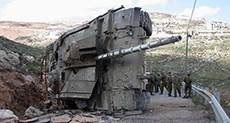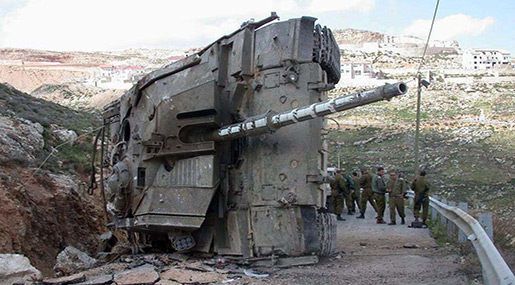«Israel» is on the Verge of a New Failure...

Jihad Haidar
"Israeli" media recently tackled the focus of the security services in Tel Aviv on the battle against Daesh [Arabic acronym for "ISIS" / "ISIL"] in Mosul for two reasons. The first is associated with the specialized side, which allows the "Israelis" to take advantage of it in order to confront the resistance movements in Gaza and Lebanon. The second is linked to the repercussions of the elimination of Daesh, specifically regarding its offshoots along Syria's southern border and in the Sinai.

Regarding solely the specialized reason [while ignoring the second reason]:
• The observations of the ["Israeli"] security services concerning the battle for Mosul does not necessarily translate into improvements in drawing lessons and turning them into operational achievements, especially after several previous confrontation stages proved that Hezbollah and the resistance in Palestine are no less skilled in the development of their capabilities and operational tactics.
• "Israel" depends on its attempt to draw lessons, among other things, from the fact that the battle in Iraq is between armies confronting a military organization calling itself the State. Therefore, the "Israelis" are supposed to take advantage of all aspects of the course of the battle and its consequences to serve the preparation process carried out by the enemy's army against Hezbollah and the resistance factions in the Gaza Strip.
• On the other hand, it is worth recalling that the failure of the process in drawing lessons cost "Israel" its prestige, deterrence, and the blood of its soldiers. The military and political leadership in Tel Aviv was inspired by the US-led wars against Yugoslavia in 1999 and Iraq in 2003 to develop capabilities and tactics thought to be effective in confronting Hezbollah. But the shock that echoed in Washington and "Tel Aviv" was that the United States has succeeded in the two arenas referred to [in Iraq, the success was represented only in toppling Saddam Hussein's regime] while "Israel" failed in confronting Hezbollah during the 2006 war, and the failures were repeated in confronting the resistance factions in the Gaza Strip specifically during the Protective Edge aggression in 2014.
• The reason for the "Israeli" failure was not due to a lack of military capabilities, technological developments, or the lack of availability of precision weapons which the US military possessed. But rather because - among several factors - Hezbollah's prior knowledge of the "Israeli" plan and its ability to employ a counter plan, which demonstrated its success in the battlefield. So, instead of "Israel" being the most brilliant in drawing conclusions, Hezbollah appeared to be the most innovative according to the course of the battle and its outcome.
• In parallel, related data constitutes an actual restriction and barrier that prevents proper "Israeli" employment and benefit. The first is that the battle is against the terrorist organization, which means that the popular and political stance is opposed to it and dismissive of this organization. On the other hand, the resistance factions in Lebanon and Palestine are part of the people that defends them. On the practical level, it may be easy to eradicate the terrorist organization imposing itself on the people. But when the resistance movements are an expression of the people's will in liberation and defense, eliminating them is not possible without eliminating the people. Their continuation depends on the continuation of the people who constantly express their identity and choices. As a result, it is easy to isolate the terrorist organization, while it is not possible to separate an object from itself, in the case of the resistance.
• Furthermore, Hezbollah possesses enormous missile capabilities that can strike the depth of Israel, including the most sensitive facilities in the entity. This capability, which is based on strong will that many stages and experiences proved, provides a wide margin for Hezbollah in deterrence and defense against any "Israeli" aggression. What reinforces the strength of Hezbollah and the Palestinian resistance factions is the positioning of the former on the borders of the occupied territories, while the latter sits in the heart of Palestine, which gives them the advantages and wider margin in confronting the enemy.
• In light of the above, it is not farfetched to state that "Israel" is on the verge of a new failure as a result of projecting the circumstances of the battle against a terrorist enemy on the popular resistance factions that derive their existence and survival from the people they belong to. But in comparison with the first failure in 2006, the results and implications of the second failure will be disastrous on the existence and security of the entity.
Source: Al-Ahed News, Translated and Edited by website team
Comments




